Impact of Talent Management on Aldi's Employee Performance
VerifiedAdded on 2022/11/24
|22
|5991
|320
Report
AI Summary
This research report delves into the critical aspects of talent management within the context of Aldi, a prominent discount supermarket chain. The study begins by establishing a foundational understanding of talent management, encompassing processes such as recruitment, selection, and retention of employees, and its significant benefits, including increased staff retention, improved company image, and market leadership. The report outlines the aim to understand the impact of talent management on employee performance, with specific objectives to explore the talent management process at Aldi, discuss its importance for business performance and growth, and analyze effective strategies for success. A comprehensive literature review examines the concept of talent management, its importance for business performance and growth, and effective strategies. The methodology section details the research approach, type, philosophy, data collection methods, sampling techniques, data analysis procedures, and ethical considerations. The report concludes with recommendations based on the research findings, offering insights for Aldi's talent management practices and strategies. The reflection and references sections provide further context and supporting materials for the study.

Research Project
Paraphrase This Document
Need a fresh take? Get an instant paraphrase of this document with our AI Paraphraser
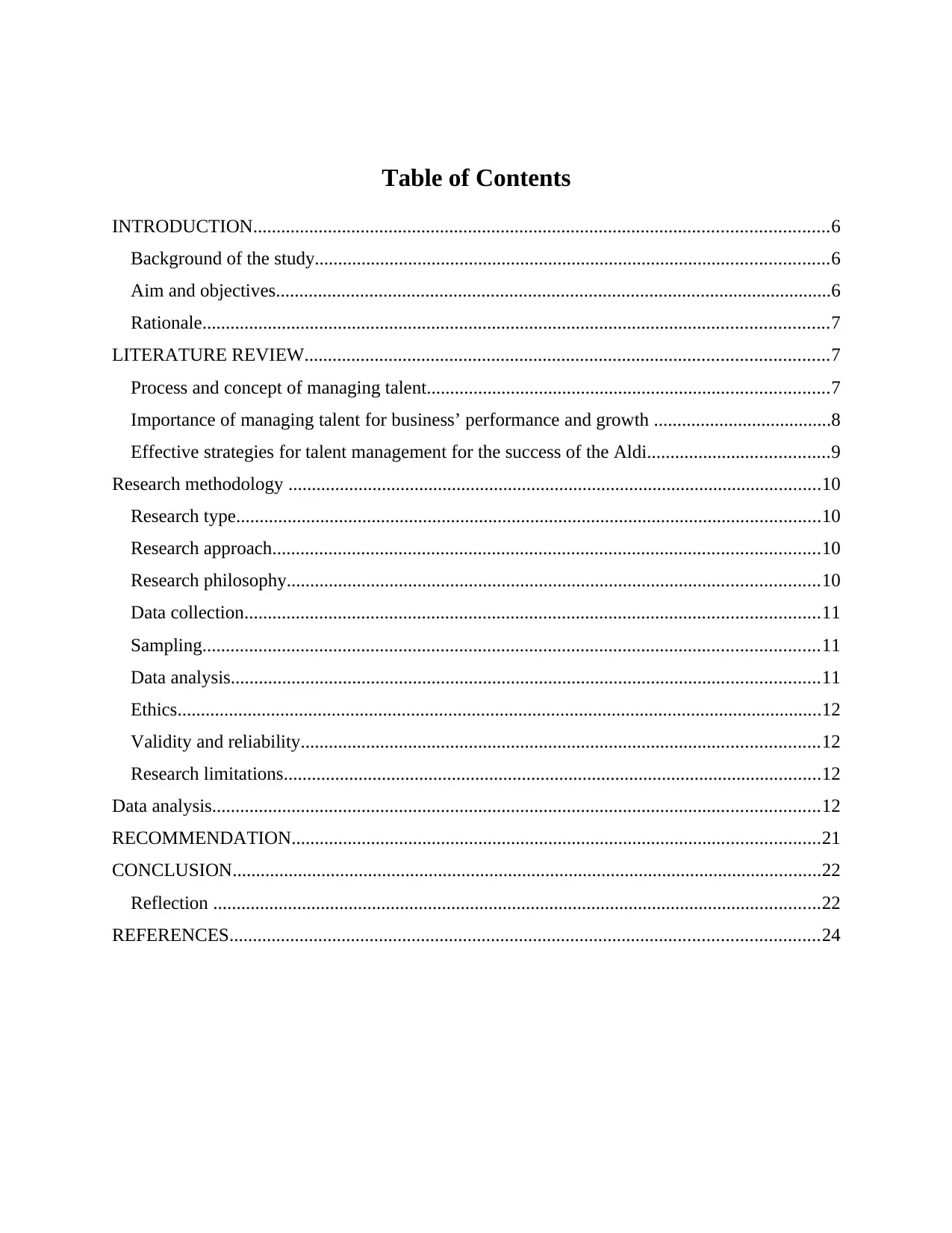
Table of Contents
INTRODUCTION...........................................................................................................................6
Background of the study..............................................................................................................6
Aim and objectives.......................................................................................................................6
Rationale......................................................................................................................................7
LITERATURE REVIEW................................................................................................................7
Process and concept of managing talent......................................................................................7
Importance of managing talent for business’ performance and growth ......................................8
Effective strategies for talent management for the success of the Aldi.......................................9
Research methodology ..................................................................................................................10
Research type.............................................................................................................................10
Research approach.....................................................................................................................10
Research philosophy..................................................................................................................10
Data collection...........................................................................................................................11
Sampling....................................................................................................................................11
Data analysis..............................................................................................................................11
Ethics..........................................................................................................................................12
Validity and reliability...............................................................................................................12
Research limitations...................................................................................................................12
Data analysis..................................................................................................................................12
RECOMMENDATION.................................................................................................................21
CONCLUSION..............................................................................................................................22
Reflection ..................................................................................................................................22
REFERENCES..............................................................................................................................24
INTRODUCTION...........................................................................................................................6
Background of the study..............................................................................................................6
Aim and objectives.......................................................................................................................6
Rationale......................................................................................................................................7
LITERATURE REVIEW................................................................................................................7
Process and concept of managing talent......................................................................................7
Importance of managing talent for business’ performance and growth ......................................8
Effective strategies for talent management for the success of the Aldi.......................................9
Research methodology ..................................................................................................................10
Research type.............................................................................................................................10
Research approach.....................................................................................................................10
Research philosophy..................................................................................................................10
Data collection...........................................................................................................................11
Sampling....................................................................................................................................11
Data analysis..............................................................................................................................11
Ethics..........................................................................................................................................12
Validity and reliability...............................................................................................................12
Research limitations...................................................................................................................12
Data analysis..................................................................................................................................12
RECOMMENDATION.................................................................................................................21
CONCLUSION..............................................................................................................................22
Reflection ..................................................................................................................................22
REFERENCES..............................................................................................................................24
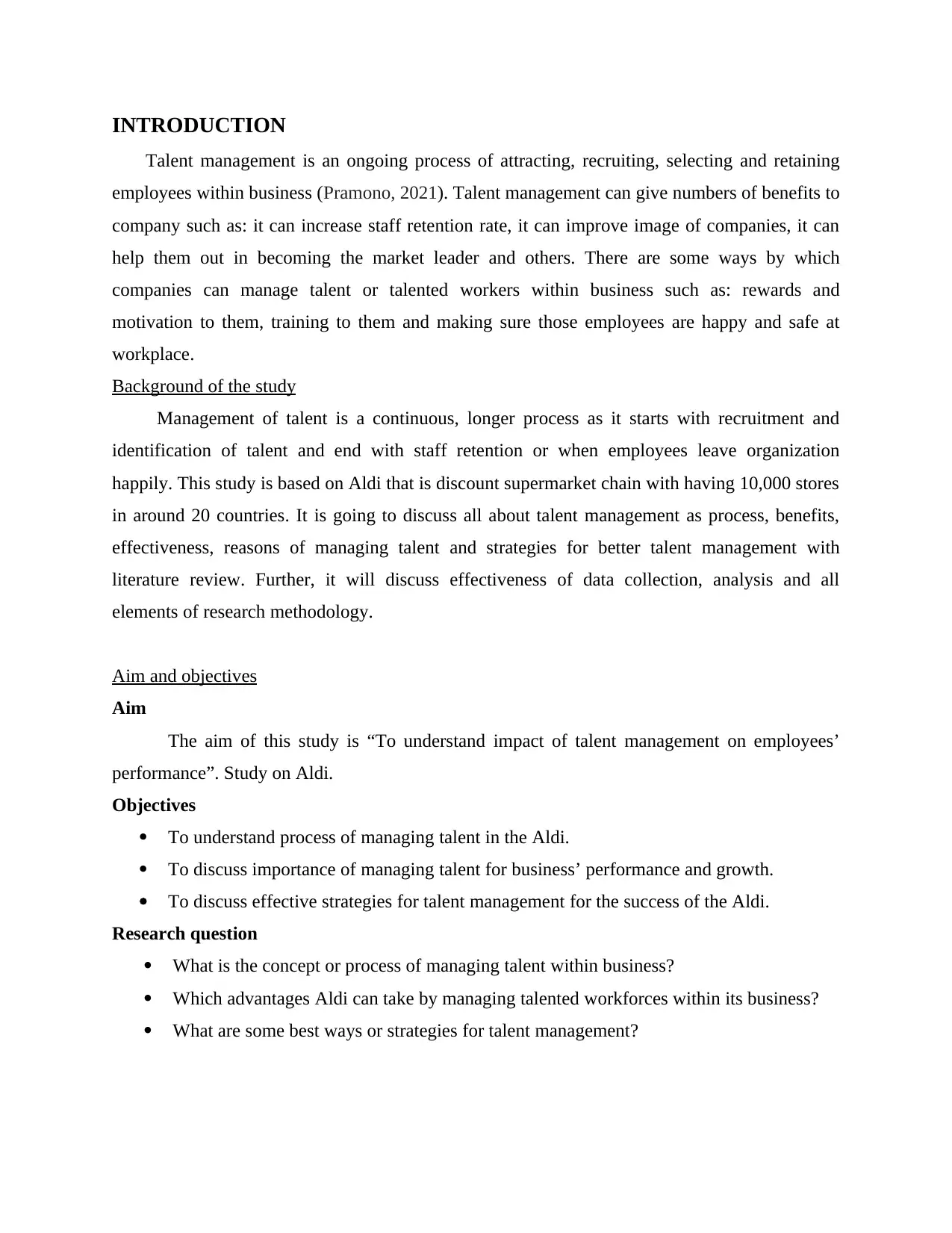
INTRODUCTION
Talent management is an ongoing process of attracting, recruiting, selecting and retaining
employees within business (Pramono, 2021). Talent management can give numbers of benefits to
company such as: it can increase staff retention rate, it can improve image of companies, it can
help them out in becoming the market leader and others. There are some ways by which
companies can manage talent or talented workers within business such as: rewards and
motivation to them, training to them and making sure those employees are happy and safe at
workplace.
Background of the study
Management of talent is a continuous, longer process as it starts with recruitment and
identification of talent and end with staff retention or when employees leave organization
happily. This study is based on Aldi that is discount supermarket chain with having 10,000 stores
in around 20 countries. It is going to discuss all about talent management as process, benefits,
effectiveness, reasons of managing talent and strategies for better talent management with
literature review. Further, it will discuss effectiveness of data collection, analysis and all
elements of research methodology.
Aim and objectives
Aim
The aim of this study is “To understand impact of talent management on employees’
performance”. Study on Aldi.
Objectives
To understand process of managing talent in the Aldi.
To discuss importance of managing talent for business’ performance and growth.
To discuss effective strategies for talent management for the success of the Aldi.
Research question
What is the concept or process of managing talent within business?
Which advantages Aldi can take by managing talented workforces within its business?
What are some best ways or strategies for talent management?
Talent management is an ongoing process of attracting, recruiting, selecting and retaining
employees within business (Pramono, 2021). Talent management can give numbers of benefits to
company such as: it can increase staff retention rate, it can improve image of companies, it can
help them out in becoming the market leader and others. There are some ways by which
companies can manage talent or talented workers within business such as: rewards and
motivation to them, training to them and making sure those employees are happy and safe at
workplace.
Background of the study
Management of talent is a continuous, longer process as it starts with recruitment and
identification of talent and end with staff retention or when employees leave organization
happily. This study is based on Aldi that is discount supermarket chain with having 10,000 stores
in around 20 countries. It is going to discuss all about talent management as process, benefits,
effectiveness, reasons of managing talent and strategies for better talent management with
literature review. Further, it will discuss effectiveness of data collection, analysis and all
elements of research methodology.
Aim and objectives
Aim
The aim of this study is “To understand impact of talent management on employees’
performance”. Study on Aldi.
Objectives
To understand process of managing talent in the Aldi.
To discuss importance of managing talent for business’ performance and growth.
To discuss effective strategies for talent management for the success of the Aldi.
Research question
What is the concept or process of managing talent within business?
Which advantages Aldi can take by managing talented workforces within its business?
What are some best ways or strategies for talent management?
⊘ This is a preview!⊘
Do you want full access?
Subscribe today to unlock all pages.

Trusted by 1+ million students worldwide
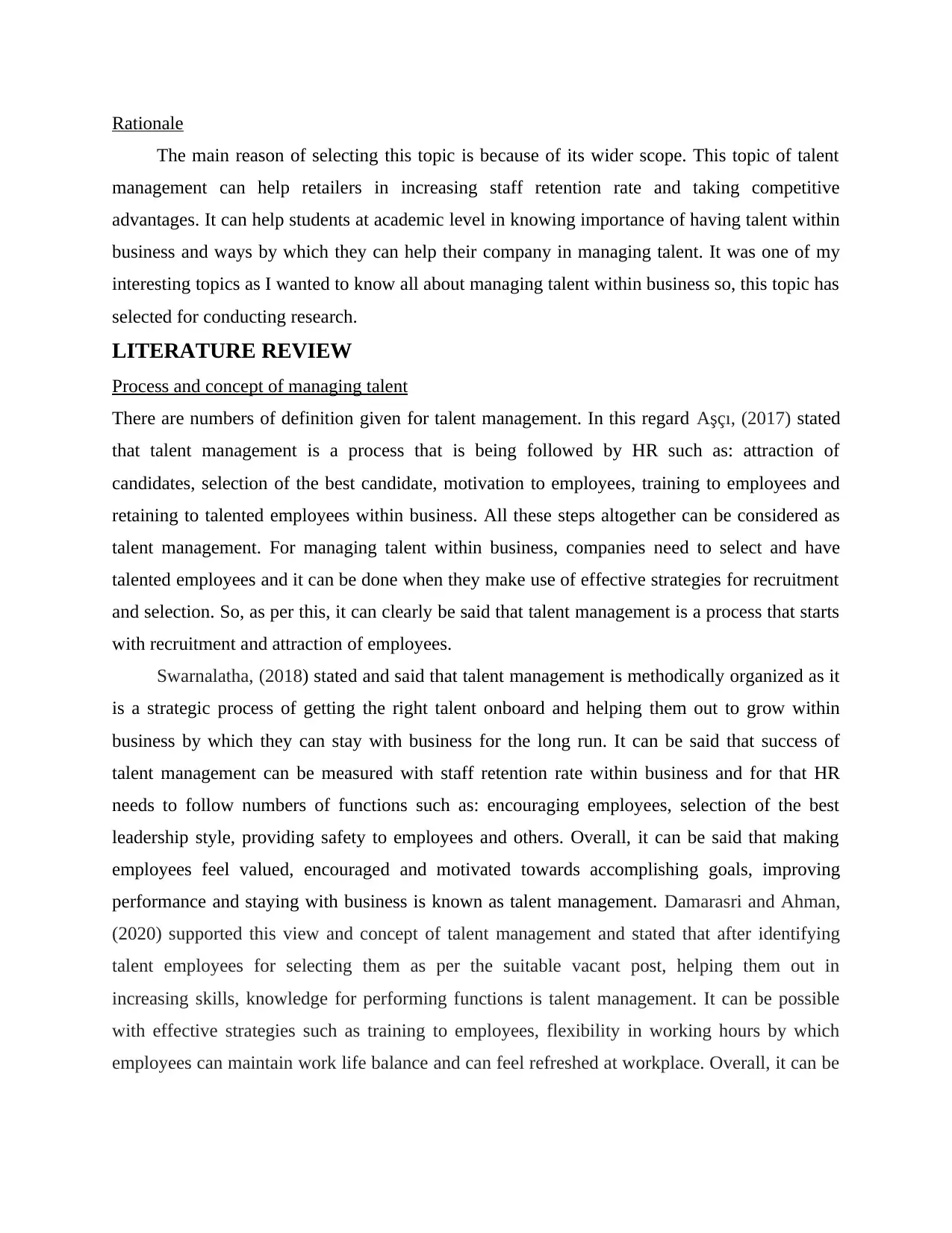
Rationale
The main reason of selecting this topic is because of its wider scope. This topic of talent
management can help retailers in increasing staff retention rate and taking competitive
advantages. It can help students at academic level in knowing importance of having talent within
business and ways by which they can help their company in managing talent. It was one of my
interesting topics as I wanted to know all about managing talent within business so, this topic has
selected for conducting research.
LITERATURE REVIEW
Process and concept of managing talent
There are numbers of definition given for talent management. In this regard Aşçı, (2017) stated
that talent management is a process that is being followed by HR such as: attraction of
candidates, selection of the best candidate, motivation to employees, training to employees and
retaining to talented employees within business. All these steps altogether can be considered as
talent management. For managing talent within business, companies need to select and have
talented employees and it can be done when they make use of effective strategies for recruitment
and selection. So, as per this, it can clearly be said that talent management is a process that starts
with recruitment and attraction of employees.
Swarnalatha, (2018) stated and said that talent management is methodically organized as it
is a strategic process of getting the right talent onboard and helping them out to grow within
business by which they can stay with business for the long run. It can be said that success of
talent management can be measured with staff retention rate within business and for that HR
needs to follow numbers of functions such as: encouraging employees, selection of the best
leadership style, providing safety to employees and others. Overall, it can be said that making
employees feel valued, encouraged and motivated towards accomplishing goals, improving
performance and staying with business is known as talent management. Damarasri and Ahman,
(2020) supported this view and concept of talent management and stated that after identifying
talent employees for selecting them as per the suitable vacant post, helping them out in
increasing skills, knowledge for performing functions is talent management. It can be possible
with effective strategies such as training to employees, flexibility in working hours by which
employees can maintain work life balance and can feel refreshed at workplace. Overall, it can be
The main reason of selecting this topic is because of its wider scope. This topic of talent
management can help retailers in increasing staff retention rate and taking competitive
advantages. It can help students at academic level in knowing importance of having talent within
business and ways by which they can help their company in managing talent. It was one of my
interesting topics as I wanted to know all about managing talent within business so, this topic has
selected for conducting research.
LITERATURE REVIEW
Process and concept of managing talent
There are numbers of definition given for talent management. In this regard Aşçı, (2017) stated
that talent management is a process that is being followed by HR such as: attraction of
candidates, selection of the best candidate, motivation to employees, training to employees and
retaining to talented employees within business. All these steps altogether can be considered as
talent management. For managing talent within business, companies need to select and have
talented employees and it can be done when they make use of effective strategies for recruitment
and selection. So, as per this, it can clearly be said that talent management is a process that starts
with recruitment and attraction of employees.
Swarnalatha, (2018) stated and said that talent management is methodically organized as it
is a strategic process of getting the right talent onboard and helping them out to grow within
business by which they can stay with business for the long run. It can be said that success of
talent management can be measured with staff retention rate within business and for that HR
needs to follow numbers of functions such as: encouraging employees, selection of the best
leadership style, providing safety to employees and others. Overall, it can be said that making
employees feel valued, encouraged and motivated towards accomplishing goals, improving
performance and staying with business is known as talent management. Damarasri and Ahman,
(2020) supported this view and concept of talent management and stated that after identifying
talent employees for selecting them as per the suitable vacant post, helping them out in
increasing skills, knowledge for performing functions is talent management. It can be possible
with effective strategies such as training to employees, flexibility in working hours by which
employees can maintain work life balance and can feel refreshed at workplace. Overall, it can be
Paraphrase This Document
Need a fresh take? Get an instant paraphrase of this document with our AI Paraphraser
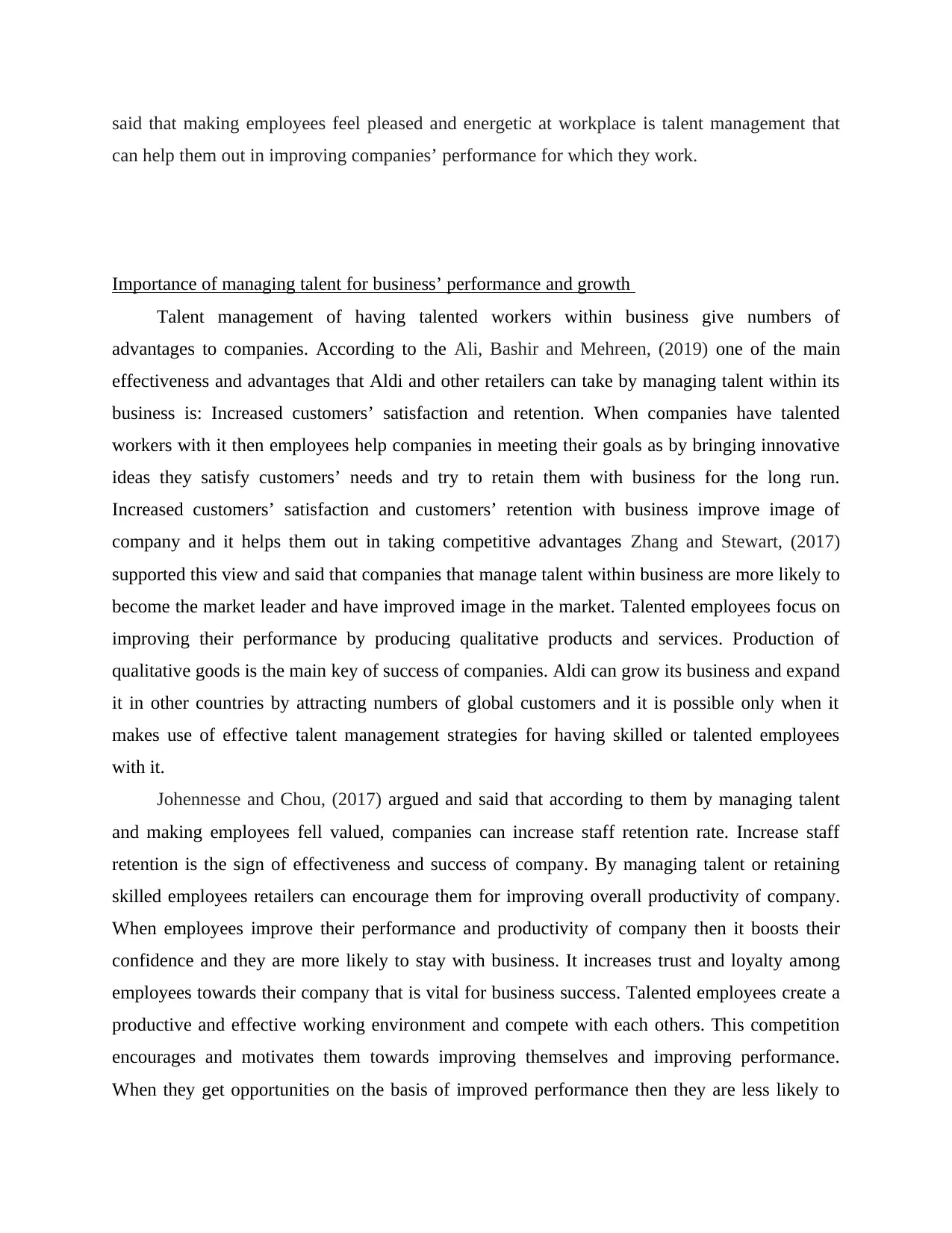
said that making employees feel pleased and energetic at workplace is talent management that
can help them out in improving companies’ performance for which they work.
Importance of managing talent for business’ performance and growth
Talent management of having talented workers within business give numbers of
advantages to companies. According to the Ali, Bashir and Mehreen, (2019) one of the main
effectiveness and advantages that Aldi and other retailers can take by managing talent within its
business is: Increased customers’ satisfaction and retention. When companies have talented
workers with it then employees help companies in meeting their goals as by bringing innovative
ideas they satisfy customers’ needs and try to retain them with business for the long run.
Increased customers’ satisfaction and customers’ retention with business improve image of
company and it helps them out in taking competitive advantages Zhang and Stewart, (2017)
supported this view and said that companies that manage talent within business are more likely to
become the market leader and have improved image in the market. Talented employees focus on
improving their performance by producing qualitative products and services. Production of
qualitative goods is the main key of success of companies. Aldi can grow its business and expand
it in other countries by attracting numbers of global customers and it is possible only when it
makes use of effective talent management strategies for having skilled or talented employees
with it.
Johennesse and Chou, (2017) argued and said that according to them by managing talent
and making employees fell valued, companies can increase staff retention rate. Increase staff
retention is the sign of effectiveness and success of company. By managing talent or retaining
skilled employees retailers can encourage them for improving overall productivity of company.
When employees improve their performance and productivity of company then it boosts their
confidence and they are more likely to stay with business. It increases trust and loyalty among
employees towards their company that is vital for business success. Talented employees create a
productive and effective working environment and compete with each others. This competition
encourages and motivates them towards improving themselves and improving performance.
When they get opportunities on the basis of improved performance then they are less likely to
can help them out in improving companies’ performance for which they work.
Importance of managing talent for business’ performance and growth
Talent management of having talented workers within business give numbers of
advantages to companies. According to the Ali, Bashir and Mehreen, (2019) one of the main
effectiveness and advantages that Aldi and other retailers can take by managing talent within its
business is: Increased customers’ satisfaction and retention. When companies have talented
workers with it then employees help companies in meeting their goals as by bringing innovative
ideas they satisfy customers’ needs and try to retain them with business for the long run.
Increased customers’ satisfaction and customers’ retention with business improve image of
company and it helps them out in taking competitive advantages Zhang and Stewart, (2017)
supported this view and said that companies that manage talent within business are more likely to
become the market leader and have improved image in the market. Talented employees focus on
improving their performance by producing qualitative products and services. Production of
qualitative goods is the main key of success of companies. Aldi can grow its business and expand
it in other countries by attracting numbers of global customers and it is possible only when it
makes use of effective talent management strategies for having skilled or talented employees
with it.
Johennesse and Chou, (2017) argued and said that according to them by managing talent
and making employees fell valued, companies can increase staff retention rate. Increase staff
retention is the sign of effectiveness and success of company. By managing talent or retaining
skilled employees retailers can encourage them for improving overall productivity of company.
When employees improve their performance and productivity of company then it boosts their
confidence and they are more likely to stay with business. It increases trust and loyalty among
employees towards their company that is vital for business success. Talented employees create a
productive and effective working environment and compete with each others. This competition
encourages and motivates them towards improving themselves and improving performance.
When they get opportunities on the basis of improved performance then they are less likely to
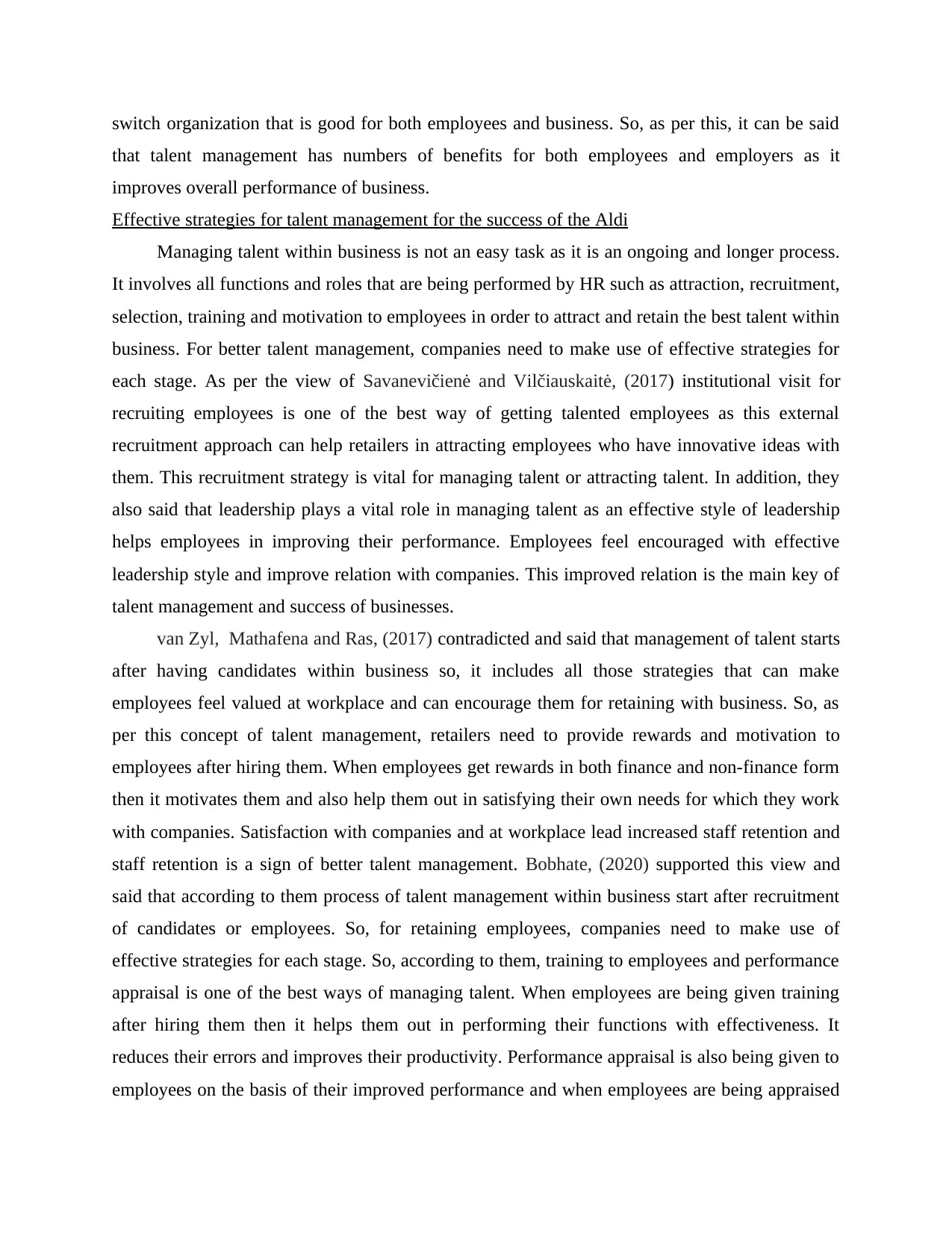
switch organization that is good for both employees and business. So, as per this, it can be said
that talent management has numbers of benefits for both employees and employers as it
improves overall performance of business.
Effective strategies for talent management for the success of the Aldi
Managing talent within business is not an easy task as it is an ongoing and longer process.
It involves all functions and roles that are being performed by HR such as attraction, recruitment,
selection, training and motivation to employees in order to attract and retain the best talent within
business. For better talent management, companies need to make use of effective strategies for
each stage. As per the view of Savanevičienė and Vilčiauskaitė, (2017) institutional visit for
recruiting employees is one of the best way of getting talented employees as this external
recruitment approach can help retailers in attracting employees who have innovative ideas with
them. This recruitment strategy is vital for managing talent or attracting talent. In addition, they
also said that leadership plays a vital role in managing talent as an effective style of leadership
helps employees in improving their performance. Employees feel encouraged with effective
leadership style and improve relation with companies. This improved relation is the main key of
talent management and success of businesses.
van Zyl, Mathafena and Ras, (2017) contradicted and said that management of talent starts
after having candidates within business so, it includes all those strategies that can make
employees feel valued at workplace and can encourage them for retaining with business. So, as
per this concept of talent management, retailers need to provide rewards and motivation to
employees after hiring them. When employees get rewards in both finance and non-finance form
then it motivates them and also help them out in satisfying their own needs for which they work
with companies. Satisfaction with companies and at workplace lead increased staff retention and
staff retention is a sign of better talent management. Bobhate, (2020) supported this view and
said that according to them process of talent management within business start after recruitment
of candidates or employees. So, for retaining employees, companies need to make use of
effective strategies for each stage. So, according to them, training to employees and performance
appraisal is one of the best ways of managing talent. When employees are being given training
after hiring them then it helps them out in performing their functions with effectiveness. It
reduces their errors and improves their productivity. Performance appraisal is also being given to
employees on the basis of their improved performance and when employees are being appraised
that talent management has numbers of benefits for both employees and employers as it
improves overall performance of business.
Effective strategies for talent management for the success of the Aldi
Managing talent within business is not an easy task as it is an ongoing and longer process.
It involves all functions and roles that are being performed by HR such as attraction, recruitment,
selection, training and motivation to employees in order to attract and retain the best talent within
business. For better talent management, companies need to make use of effective strategies for
each stage. As per the view of Savanevičienė and Vilčiauskaitė, (2017) institutional visit for
recruiting employees is one of the best way of getting talented employees as this external
recruitment approach can help retailers in attracting employees who have innovative ideas with
them. This recruitment strategy is vital for managing talent or attracting talent. In addition, they
also said that leadership plays a vital role in managing talent as an effective style of leadership
helps employees in improving their performance. Employees feel encouraged with effective
leadership style and improve relation with companies. This improved relation is the main key of
talent management and success of businesses.
van Zyl, Mathafena and Ras, (2017) contradicted and said that management of talent starts
after having candidates within business so, it includes all those strategies that can make
employees feel valued at workplace and can encourage them for retaining with business. So, as
per this concept of talent management, retailers need to provide rewards and motivation to
employees after hiring them. When employees get rewards in both finance and non-finance form
then it motivates them and also help them out in satisfying their own needs for which they work
with companies. Satisfaction with companies and at workplace lead increased staff retention and
staff retention is a sign of better talent management. Bobhate, (2020) supported this view and
said that according to them process of talent management within business start after recruitment
of candidates or employees. So, for retaining employees, companies need to make use of
effective strategies for each stage. So, according to them, training to employees and performance
appraisal is one of the best ways of managing talent. When employees are being given training
after hiring them then it helps them out in performing their functions with effectiveness. It
reduces their errors and improves their productivity. Performance appraisal is also being given to
employees on the basis of their improved performance and when employees are being appraised
⊘ This is a preview!⊘
Do you want full access?
Subscribe today to unlock all pages.

Trusted by 1+ million students worldwide
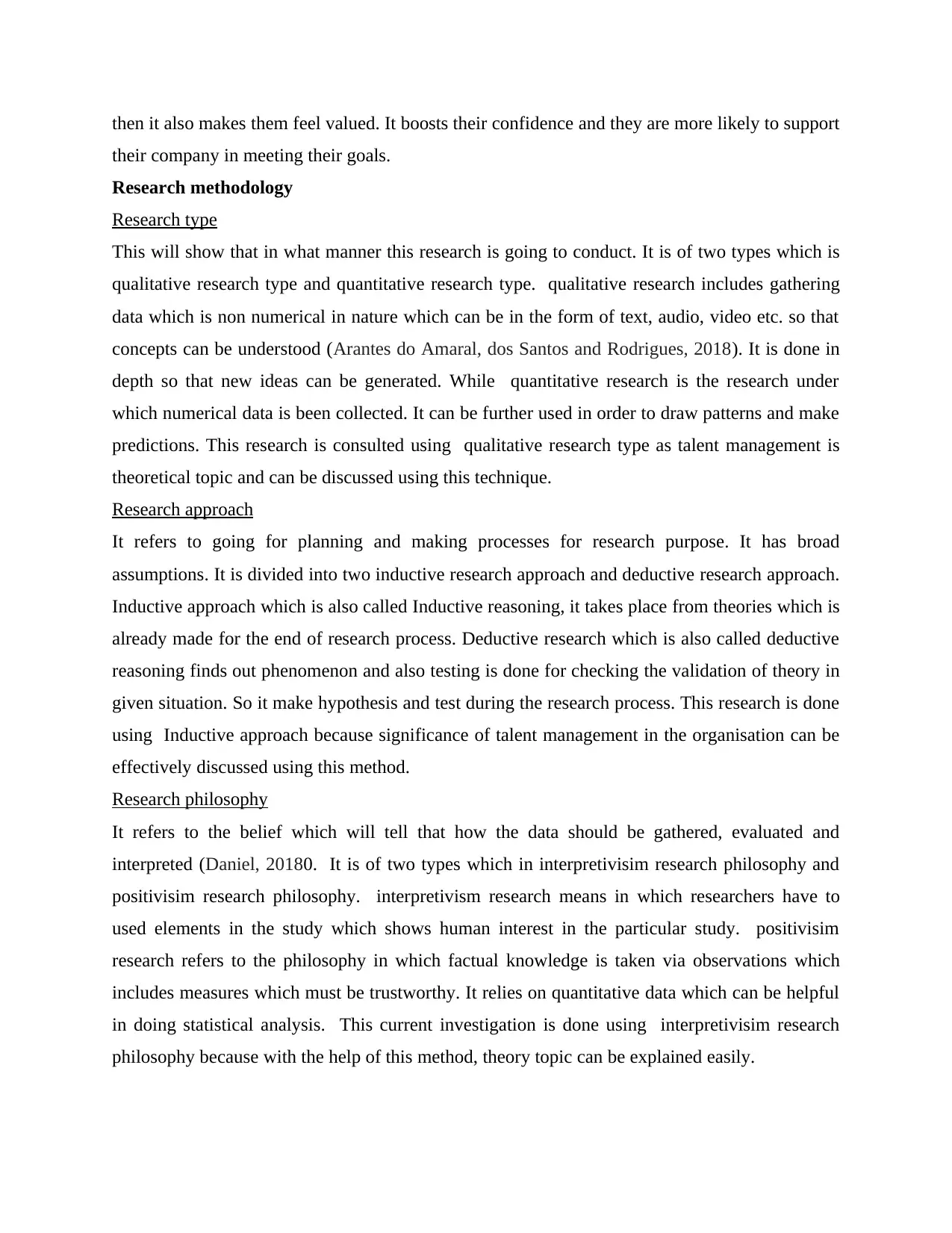
then it also makes them feel valued. It boosts their confidence and they are more likely to support
their company in meeting their goals.
Research methodology
Research type
This will show that in what manner this research is going to conduct. It is of two types which is
qualitative research type and quantitative research type. qualitative research includes gathering
data which is non numerical in nature which can be in the form of text, audio, video etc. so that
concepts can be understood (Arantes do Amaral, dos Santos and Rodrigues, 2018). It is done in
depth so that new ideas can be generated. While quantitative research is the research under
which numerical data is been collected. It can be further used in order to draw patterns and make
predictions. This research is consulted using qualitative research type as talent management is
theoretical topic and can be discussed using this technique.
Research approach
It refers to going for planning and making processes for research purpose. It has broad
assumptions. It is divided into two inductive research approach and deductive research approach.
Inductive approach which is also called Inductive reasoning, it takes place from theories which is
already made for the end of research process. Deductive research which is also called deductive
reasoning finds out phenomenon and also testing is done for checking the validation of theory in
given situation. So it make hypothesis and test during the research process. This research is done
using Inductive approach because significance of talent management in the organisation can be
effectively discussed using this method.
Research philosophy
It refers to the belief which will tell that how the data should be gathered, evaluated and
interpreted (Daniel, 20180. It is of two types which in interpretivisim research philosophy and
positivisim research philosophy. interpretivism research means in which researchers have to
used elements in the study which shows human interest in the particular study. positivisim
research refers to the philosophy in which factual knowledge is taken via observations which
includes measures which must be trustworthy. It relies on quantitative data which can be helpful
in doing statistical analysis. This current investigation is done using interpretivisim research
philosophy because with the help of this method, theory topic can be explained easily.
their company in meeting their goals.
Research methodology
Research type
This will show that in what manner this research is going to conduct. It is of two types which is
qualitative research type and quantitative research type. qualitative research includes gathering
data which is non numerical in nature which can be in the form of text, audio, video etc. so that
concepts can be understood (Arantes do Amaral, dos Santos and Rodrigues, 2018). It is done in
depth so that new ideas can be generated. While quantitative research is the research under
which numerical data is been collected. It can be further used in order to draw patterns and make
predictions. This research is consulted using qualitative research type as talent management is
theoretical topic and can be discussed using this technique.
Research approach
It refers to going for planning and making processes for research purpose. It has broad
assumptions. It is divided into two inductive research approach and deductive research approach.
Inductive approach which is also called Inductive reasoning, it takes place from theories which is
already made for the end of research process. Deductive research which is also called deductive
reasoning finds out phenomenon and also testing is done for checking the validation of theory in
given situation. So it make hypothesis and test during the research process. This research is done
using Inductive approach because significance of talent management in the organisation can be
effectively discussed using this method.
Research philosophy
It refers to the belief which will tell that how the data should be gathered, evaluated and
interpreted (Daniel, 20180. It is of two types which in interpretivisim research philosophy and
positivisim research philosophy. interpretivism research means in which researchers have to
used elements in the study which shows human interest in the particular study. positivisim
research refers to the philosophy in which factual knowledge is taken via observations which
includes measures which must be trustworthy. It relies on quantitative data which can be helpful
in doing statistical analysis. This current investigation is done using interpretivisim research
philosophy because with the help of this method, theory topic can be explained easily.
Paraphrase This Document
Need a fresh take? Get an instant paraphrase of this document with our AI Paraphraser
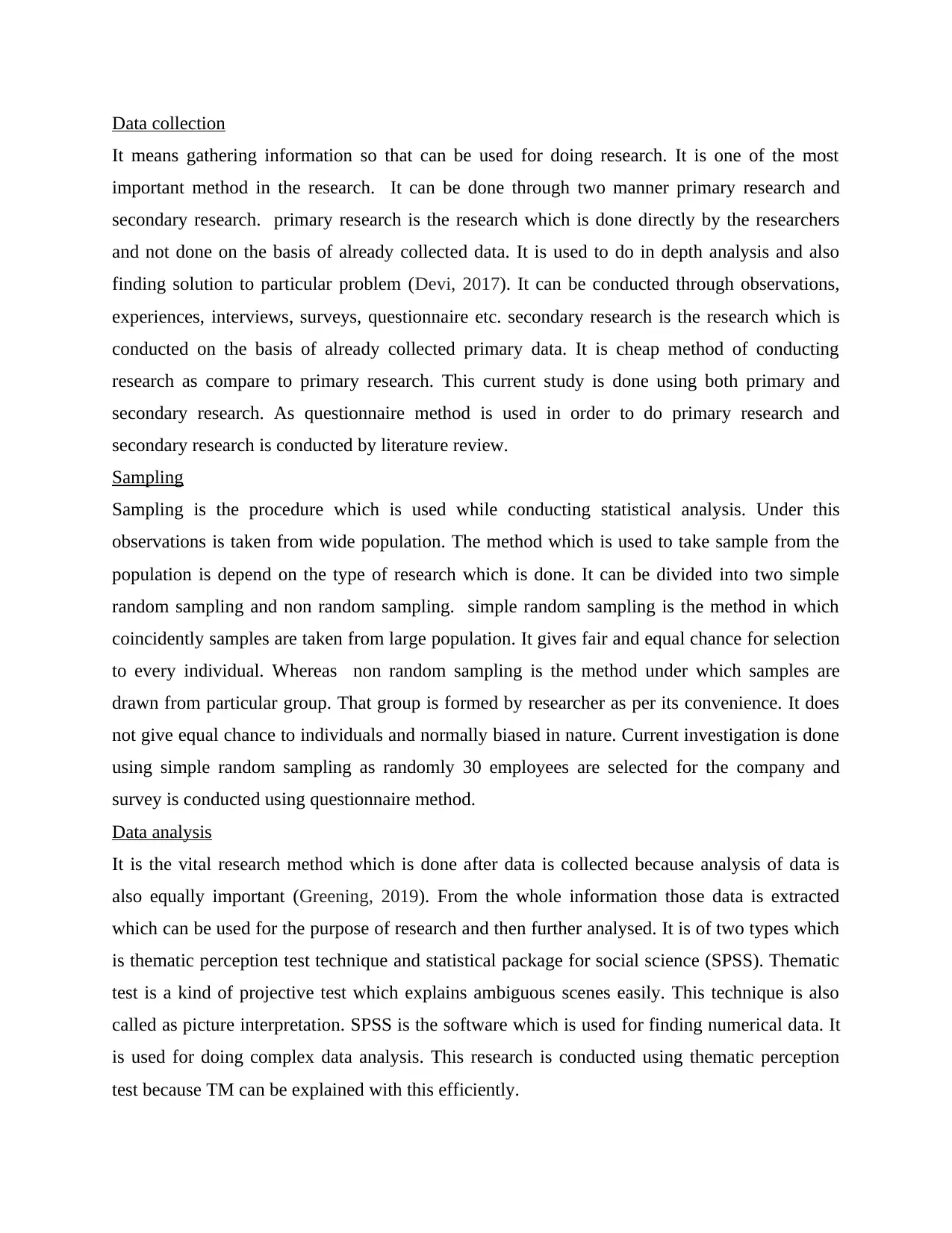
Data collection
It means gathering information so that can be used for doing research. It is one of the most
important method in the research. It can be done through two manner primary research and
secondary research. primary research is the research which is done directly by the researchers
and not done on the basis of already collected data. It is used to do in depth analysis and also
finding solution to particular problem (Devi, 2017). It can be conducted through observations,
experiences, interviews, surveys, questionnaire etc. secondary research is the research which is
conducted on the basis of already collected primary data. It is cheap method of conducting
research as compare to primary research. This current study is done using both primary and
secondary research. As questionnaire method is used in order to do primary research and
secondary research is conducted by literature review.
Sampling
Sampling is the procedure which is used while conducting statistical analysis. Under this
observations is taken from wide population. The method which is used to take sample from the
population is depend on the type of research which is done. It can be divided into two simple
random sampling and non random sampling. simple random sampling is the method in which
coincidently samples are taken from large population. It gives fair and equal chance for selection
to every individual. Whereas non random sampling is the method under which samples are
drawn from particular group. That group is formed by researcher as per its convenience. It does
not give equal chance to individuals and normally biased in nature. Current investigation is done
using simple random sampling as randomly 30 employees are selected for the company and
survey is conducted using questionnaire method.
Data analysis
It is the vital research method which is done after data is collected because analysis of data is
also equally important (Greening, 2019). From the whole information those data is extracted
which can be used for the purpose of research and then further analysed. It is of two types which
is thematic perception test technique and statistical package for social science (SPSS). Thematic
test is a kind of projective test which explains ambiguous scenes easily. This technique is also
called as picture interpretation. SPSS is the software which is used for finding numerical data. It
is used for doing complex data analysis. This research is conducted using thematic perception
test because TM can be explained with this efficiently.
It means gathering information so that can be used for doing research. It is one of the most
important method in the research. It can be done through two manner primary research and
secondary research. primary research is the research which is done directly by the researchers
and not done on the basis of already collected data. It is used to do in depth analysis and also
finding solution to particular problem (Devi, 2017). It can be conducted through observations,
experiences, interviews, surveys, questionnaire etc. secondary research is the research which is
conducted on the basis of already collected primary data. It is cheap method of conducting
research as compare to primary research. This current study is done using both primary and
secondary research. As questionnaire method is used in order to do primary research and
secondary research is conducted by literature review.
Sampling
Sampling is the procedure which is used while conducting statistical analysis. Under this
observations is taken from wide population. The method which is used to take sample from the
population is depend on the type of research which is done. It can be divided into two simple
random sampling and non random sampling. simple random sampling is the method in which
coincidently samples are taken from large population. It gives fair and equal chance for selection
to every individual. Whereas non random sampling is the method under which samples are
drawn from particular group. That group is formed by researcher as per its convenience. It does
not give equal chance to individuals and normally biased in nature. Current investigation is done
using simple random sampling as randomly 30 employees are selected for the company and
survey is conducted using questionnaire method.
Data analysis
It is the vital research method which is done after data is collected because analysis of data is
also equally important (Greening, 2019). From the whole information those data is extracted
which can be used for the purpose of research and then further analysed. It is of two types which
is thematic perception test technique and statistical package for social science (SPSS). Thematic
test is a kind of projective test which explains ambiguous scenes easily. This technique is also
called as picture interpretation. SPSS is the software which is used for finding numerical data. It
is used for doing complex data analysis. This research is conducted using thematic perception
test because TM can be explained with this efficiently.
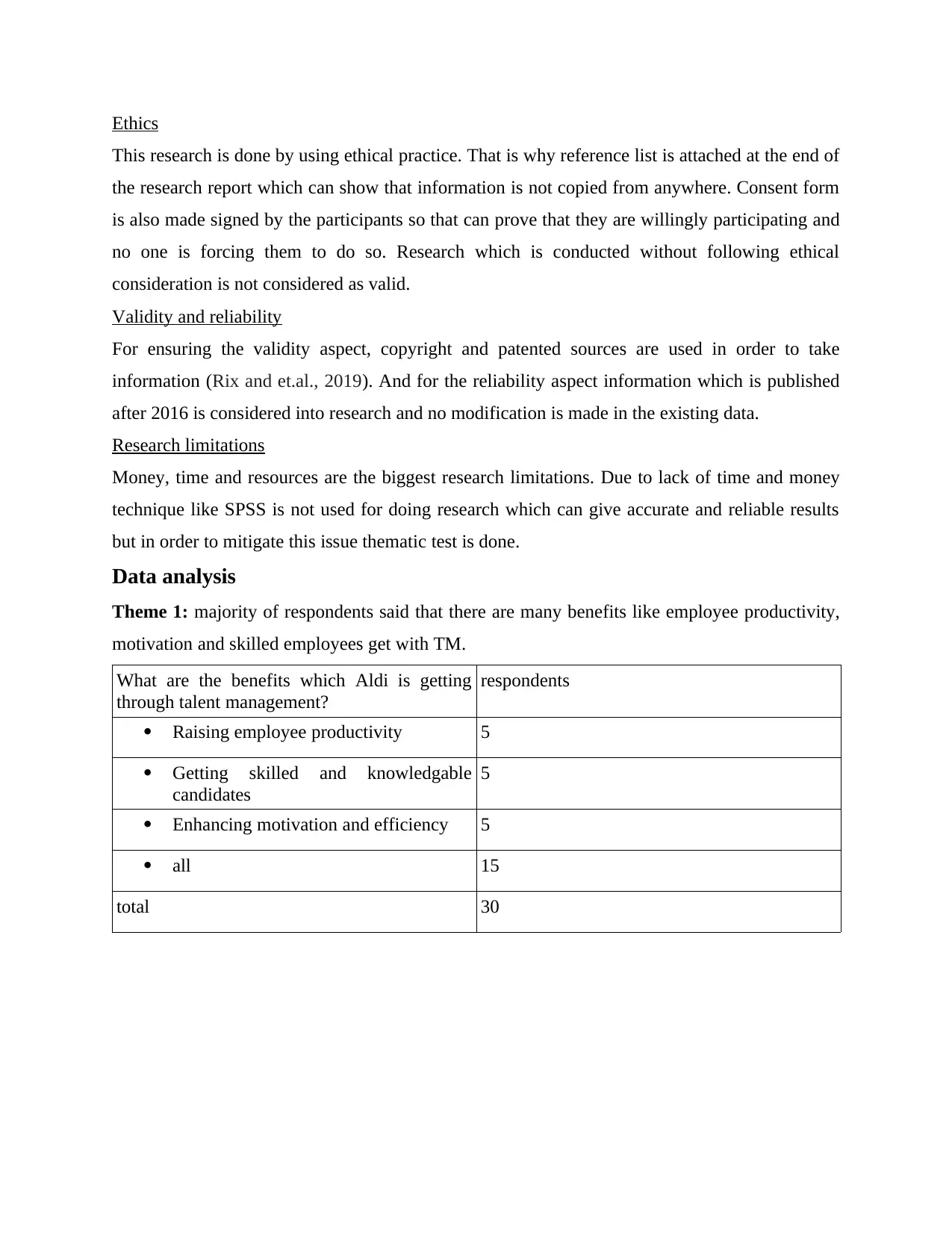
Ethics
This research is done by using ethical practice. That is why reference list is attached at the end of
the research report which can show that information is not copied from anywhere. Consent form
is also made signed by the participants so that can prove that they are willingly participating and
no one is forcing them to do so. Research which is conducted without following ethical
consideration is not considered as valid.
Validity and reliability
For ensuring the validity aspect, copyright and patented sources are used in order to take
information (Rix and et.al., 2019). And for the reliability aspect information which is published
after 2016 is considered into research and no modification is made in the existing data.
Research limitations
Money, time and resources are the biggest research limitations. Due to lack of time and money
technique like SPSS is not used for doing research which can give accurate and reliable results
but in order to mitigate this issue thematic test is done.
Data analysis
Theme 1: majority of respondents said that there are many benefits like employee productivity,
motivation and skilled employees get with TM.
What are the benefits which Aldi is getting
through talent management?
respondents
Raising employee productivity 5
Getting skilled and knowledgable
candidates
5
Enhancing motivation and efficiency 5
all 15
total 30
This research is done by using ethical practice. That is why reference list is attached at the end of
the research report which can show that information is not copied from anywhere. Consent form
is also made signed by the participants so that can prove that they are willingly participating and
no one is forcing them to do so. Research which is conducted without following ethical
consideration is not considered as valid.
Validity and reliability
For ensuring the validity aspect, copyright and patented sources are used in order to take
information (Rix and et.al., 2019). And for the reliability aspect information which is published
after 2016 is considered into research and no modification is made in the existing data.
Research limitations
Money, time and resources are the biggest research limitations. Due to lack of time and money
technique like SPSS is not used for doing research which can give accurate and reliable results
but in order to mitigate this issue thematic test is done.
Data analysis
Theme 1: majority of respondents said that there are many benefits like employee productivity,
motivation and skilled employees get with TM.
What are the benefits which Aldi is getting
through talent management?
respondents
Raising employee productivity 5
Getting skilled and knowledgable
candidates
5
Enhancing motivation and efficiency 5
all 15
total 30
⊘ This is a preview!⊘
Do you want full access?
Subscribe today to unlock all pages.

Trusted by 1+ million students worldwide
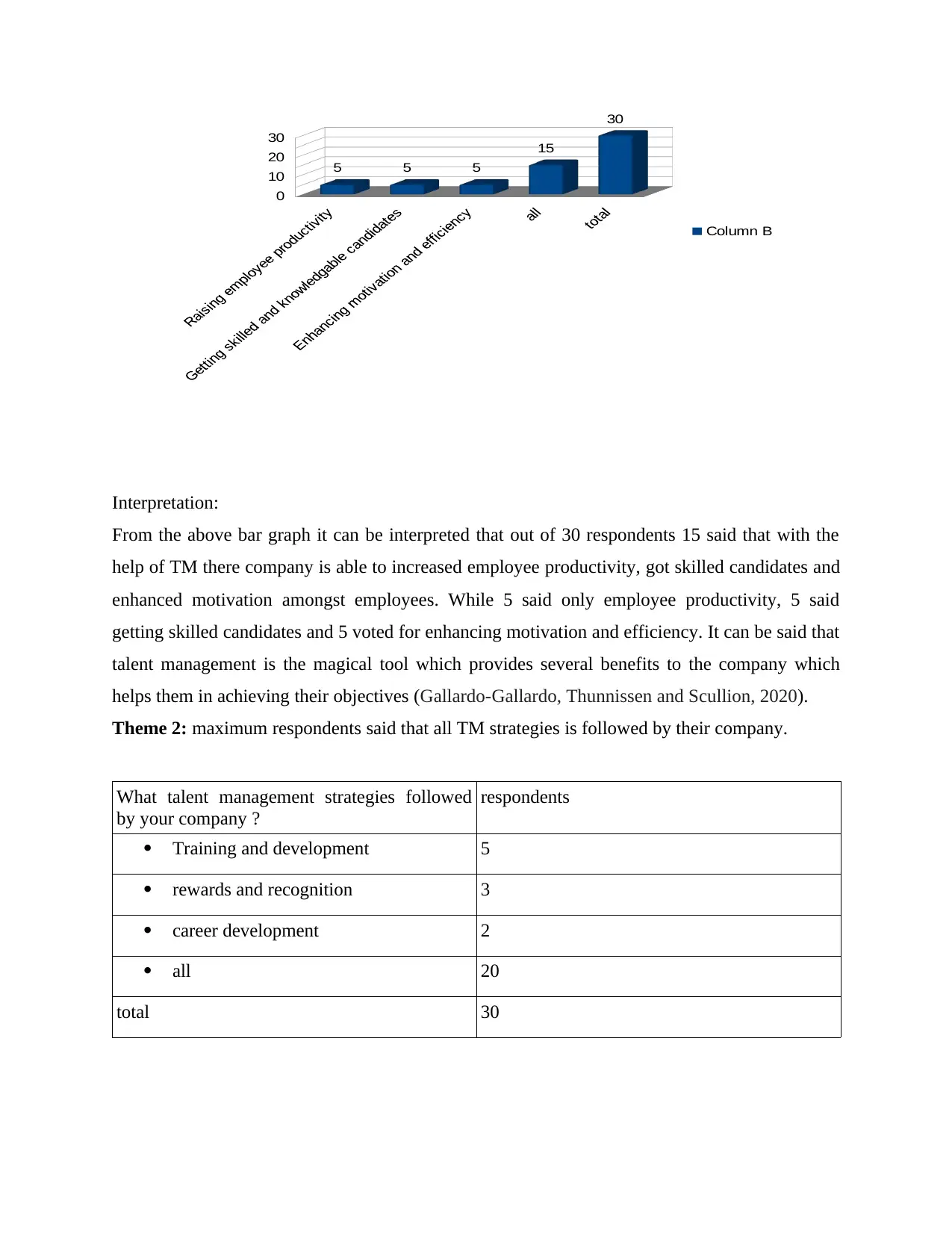
Interpretation:
From the above bar graph it can be interpreted that out of 30 respondents 15 said that with the
help of TM there company is able to increased employee productivity, got skilled candidates and
enhanced motivation amongst employees. While 5 said only employee productivity, 5 said
getting skilled candidates and 5 voted for enhancing motivation and efficiency. It can be said that
talent management is the magical tool which provides several benefits to the company which
helps them in achieving their objectives (Gallardo-Gallardo, Thunnissen and Scullion, 2020).
Theme 2: maximum respondents said that all TM strategies is followed by their company.
What talent management strategies followed
by your company ?
respondents
Training and development 5
rewards and recognition 3
career development 2
all 20
total 30
0
10
20
30
5 5 5
15
30
Column B
From the above bar graph it can be interpreted that out of 30 respondents 15 said that with the
help of TM there company is able to increased employee productivity, got skilled candidates and
enhanced motivation amongst employees. While 5 said only employee productivity, 5 said
getting skilled candidates and 5 voted for enhancing motivation and efficiency. It can be said that
talent management is the magical tool which provides several benefits to the company which
helps them in achieving their objectives (Gallardo-Gallardo, Thunnissen and Scullion, 2020).
Theme 2: maximum respondents said that all TM strategies is followed by their company.
What talent management strategies followed
by your company ?
respondents
Training and development 5
rewards and recognition 3
career development 2
all 20
total 30
0
10
20
30
5 5 5
15
30
Column B
Paraphrase This Document
Need a fresh take? Get an instant paraphrase of this document with our AI Paraphraser
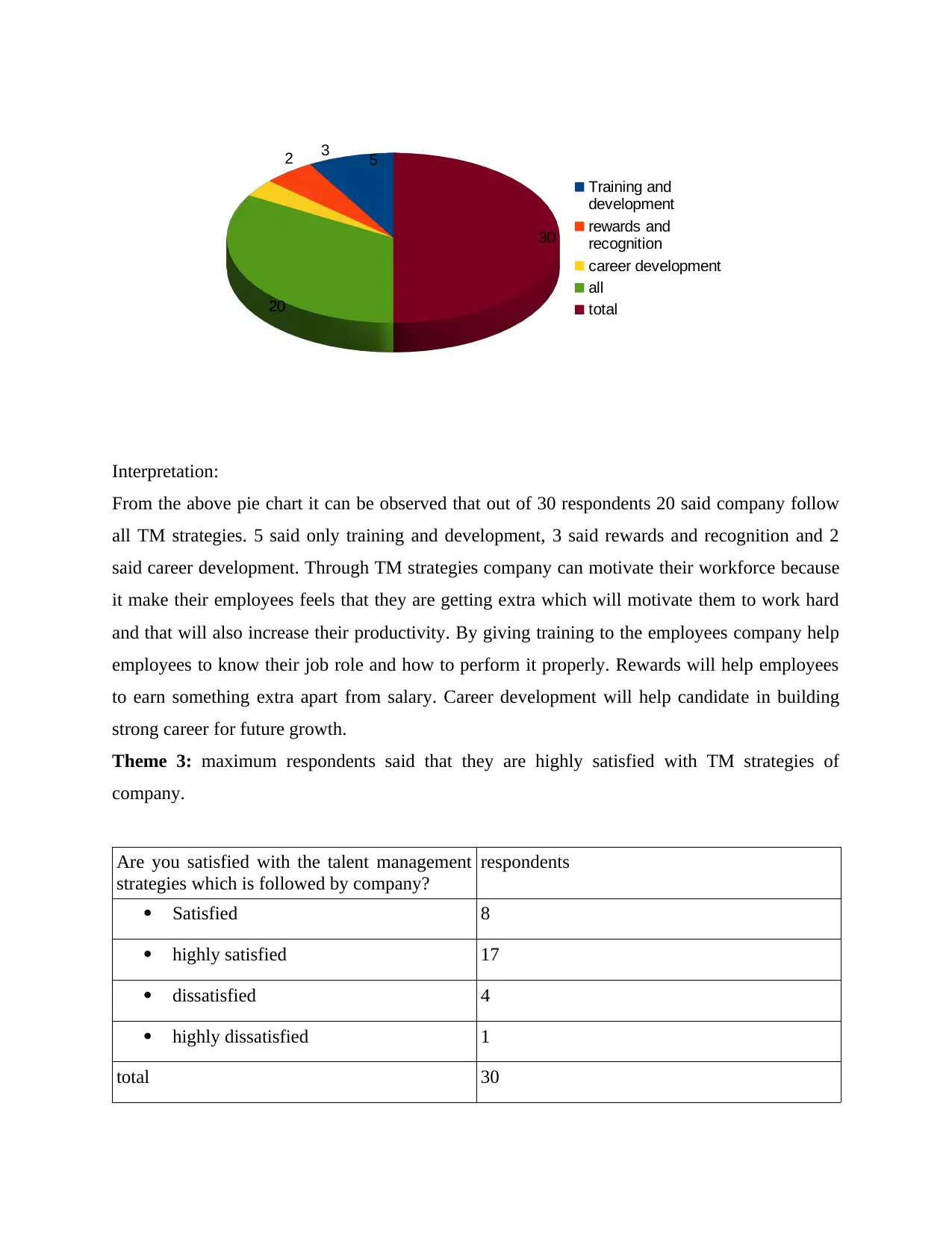
Interpretation:
From the above pie chart it can be observed that out of 30 respondents 20 said company follow
all TM strategies. 5 said only training and development, 3 said rewards and recognition and 2
said career development. Through TM strategies company can motivate their workforce because
it make their employees feels that they are getting extra which will motivate them to work hard
and that will also increase their productivity. By giving training to the employees company help
employees to know their job role and how to perform it properly. Rewards will help employees
to earn something extra apart from salary. Career development will help candidate in building
strong career for future growth.
Theme 3: maximum respondents said that they are highly satisfied with TM strategies of
company.
Are you satisfied with the talent management
strategies which is followed by company?
respondents
Satisfied 8
highly satisfied 17
dissatisfied 4
highly dissatisfied 1
total 30
5
3
2
20
30
Training and
development
rewards and
recognition
career development
all
total
From the above pie chart it can be observed that out of 30 respondents 20 said company follow
all TM strategies. 5 said only training and development, 3 said rewards and recognition and 2
said career development. Through TM strategies company can motivate their workforce because
it make their employees feels that they are getting extra which will motivate them to work hard
and that will also increase their productivity. By giving training to the employees company help
employees to know their job role and how to perform it properly. Rewards will help employees
to earn something extra apart from salary. Career development will help candidate in building
strong career for future growth.
Theme 3: maximum respondents said that they are highly satisfied with TM strategies of
company.
Are you satisfied with the talent management
strategies which is followed by company?
respondents
Satisfied 8
highly satisfied 17
dissatisfied 4
highly dissatisfied 1
total 30
5
3
2
20
30
Training and
development
rewards and
recognition
career development
all
total
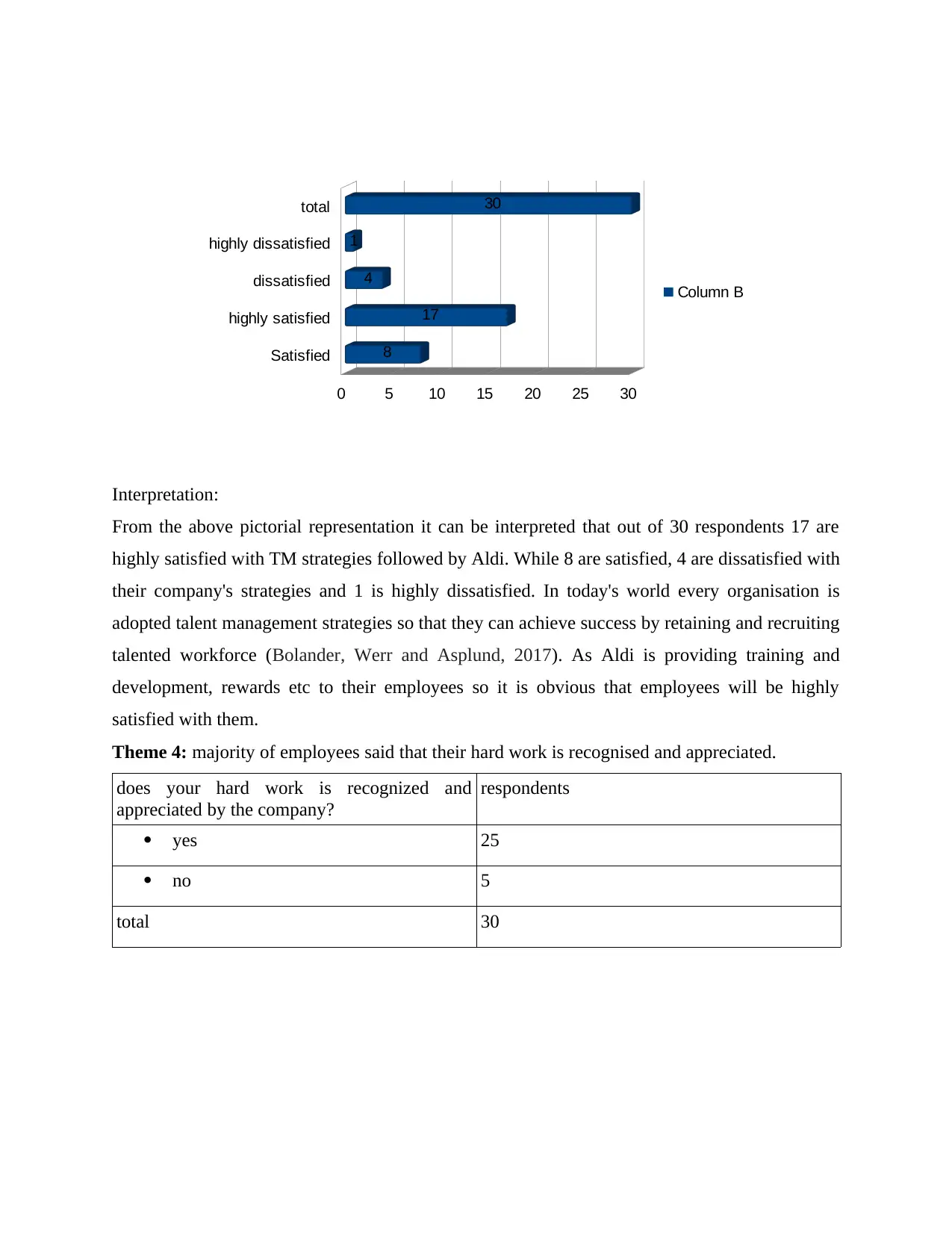
Interpretation:
From the above pictorial representation it can be interpreted that out of 30 respondents 17 are
highly satisfied with TM strategies followed by Aldi. While 8 are satisfied, 4 are dissatisfied with
their company's strategies and 1 is highly dissatisfied. In today's world every organisation is
adopted talent management strategies so that they can achieve success by retaining and recruiting
talented workforce (Bolander, Werr and Asplund, 2017). As Aldi is providing training and
development, rewards etc to their employees so it is obvious that employees will be highly
satisfied with them.
Theme 4: majority of employees said that their hard work is recognised and appreciated.
does your hard work is recognized and
appreciated by the company?
respondents
yes 25
no 5
total 30
Satisfied
highly satisfied
dissatisfied
highly dissatisfied
total
0 5 10 15 20 25 30
8
17
4
1
30
Column B
From the above pictorial representation it can be interpreted that out of 30 respondents 17 are
highly satisfied with TM strategies followed by Aldi. While 8 are satisfied, 4 are dissatisfied with
their company's strategies and 1 is highly dissatisfied. In today's world every organisation is
adopted talent management strategies so that they can achieve success by retaining and recruiting
talented workforce (Bolander, Werr and Asplund, 2017). As Aldi is providing training and
development, rewards etc to their employees so it is obvious that employees will be highly
satisfied with them.
Theme 4: majority of employees said that their hard work is recognised and appreciated.
does your hard work is recognized and
appreciated by the company?
respondents
yes 25
no 5
total 30
Satisfied
highly satisfied
dissatisfied
highly dissatisfied
total
0 5 10 15 20 25 30
8
17
4
1
30
Column B
⊘ This is a preview!⊘
Do you want full access?
Subscribe today to unlock all pages.

Trusted by 1+ million students worldwide
1 out of 22
Related Documents
Your All-in-One AI-Powered Toolkit for Academic Success.
+13062052269
info@desklib.com
Available 24*7 on WhatsApp / Email
![[object Object]](/_next/static/media/star-bottom.7253800d.svg)
Unlock your academic potential
Copyright © 2020–2026 A2Z Services. All Rights Reserved. Developed and managed by ZUCOL.




